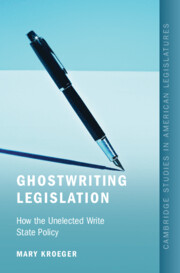Refine listing
Actions for selected content:
1299955 results in Books
International Leviathans
- Practices of Sovereignty by International Administrations
- Coming soon
-
- Expected online publication date:
- June 2026
- Print publication:
- 30 June 2026
-
- Book
- Export citation
Judging for Democracy
- Principles and Strategies in Hybrid Regimes
- Coming soon
-
- Expected online publication date:
- June 2026
- Print publication:
- 30 June 2026
-
- Book
- Export citation
How Data Need People
- The Social and Epistemic Practice of a Data-Rich Science
- Coming soon
-
- Expected online publication date:
- June 2026
- Print publication:
- 30 June 2026
-
- Book
- Export citation
Against the Machine
- Why Party Competition Disrupts Vote Buying
- Coming soon
-
- Expected online publication date:
- June 2026
- Print publication:
- 30 June 2026
-
- Book
- Export citation
Tempering Power
- Beyond the Rule of Law
- Coming soon
-
- Expected online publication date:
- June 2026
- Print publication:
- 30 June 2026
-
- Book
- Export citation
Contextualizing Psychology
- Critical Perspectives and Person-Oriented Approaches
- Coming soon
-
- Expected online publication date:
- June 2026
- Print publication:
- 30 June 2026
-
- Book
- Export citation
Democratic Representation in International Organizations
- Coming soon
-
- Expected online publication date:
- June 2026
- Print publication:
- 30 June 2026
-
- Book
- Export citation

For, Against, Together
- Rethinking Antagonistic Political Emotions
- Coming soon
-
- Expected online publication date:
- June 2026
- Print publication:
- 30 June 2026
-
- Book
- Export citation
Quantitative Easing and Tightening
- Lessons After the Financial Crisis
- Coming soon
-
- Expected online publication date:
- June 2026
- Print publication:
- 30 June 2026
-
- Book
- Export citation
OSCEs for the Final FFICM
- Coming soon
-
- Expected online publication date:
- June 2026
- Print publication:
- 30 June 2026
-
- Book
- Export citation
Race, Power, and Practice
- A Critical Race Framework for Social Work
- Coming soon
-
- Expected online publication date:
- June 2026
- Print publication:
- 30 June 2026
-
- Textbook
- Export citation

Teaching with Instructional Video
- Coming soon
-
- Expected online publication date:
- June 2026
- Print publication:
- 30 June 2026
-
- Book
- Export citation

Lady Church in the Christian Imagination
- From Early Christianity to Early Modernity
- Coming soon
-
- Expected online publication date:
- June 2026
- Print publication:
- 30 June 2026
-
- Book
- Export citation
Ramification Groups of Local Fields
- with Geometric Applications
- Coming soon
-
- Expected online publication date:
- June 2026
- Print publication:
- 30 June 2026
-
- Book
- Export citation
Crime and Punishment in India
- Police, Judiciary, and Access to Justice
- Coming soon
-
- Expected online publication date:
- June 2026
- Print publication:
- 30 June 2026
-
- Book
- Export citation

A Primer, and Beyond, on Composition Operators on the Unit Disk
- Coming soon
-
- Expected online publication date:
- June 2026
- Print publication:
- 30 June 2026
-
- Book
- Export citation
Jobless Growth and the New Great Transformation
- A Data Driven Analysis
- Coming soon
-
- Expected online publication date:
- June 2026
- Print publication:
- 30 June 2026
-
- Book
- Export citation
‘I Felt All This’
- Enslaved People's Emotional Lives in the Antebellum US South
- Coming soon
-
- Expected online publication date:
- June 2026
- Print publication:
- 31 July 2026
-
- Book
- Export citation

Ghostwriting Legislation
- How the Unelected Write State Policy
- Coming soon
-
- Expected online publication date:
- June 2026
- Print publication:
- 30 June 2026
-
- Book
- Export citation
Recreational Drugs Repurposed for Medicinal Use
- Coming soon
-
- Expected online publication date:
- June 2026
- Print publication:
- 30 June 2026
-
- Book
- Export citation
